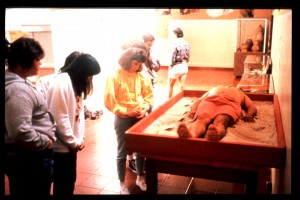Americas Forum 2016 to Focus on Violence, Memory
On April 8, the Center for the Americas will host the Americas Forum 2016, “A Hemispheric Conversation on Violence and Memory,” in the Russell House.
The Americas Forum is an annual symposium that brings into dialogue scholars and artists from “north” and “south” around a common theme. This year’s forum features three panelists and a performance artist who will engage in a conversation over the roles that colonialism, settler colonialism, and nation-building continue to play within the complex dialectic between memory, the archive (writ broadly), and the State. The panel starts at 2:30 p.m., and the event ends around 6:30 p.m. after the performance.
The panelists are:
- Kirsten Weld of Harvard University, who has written on the archives generated by Guatemala’s National Police, which were used as tools of state repression during the country’s civil war, kept hidden from the truth commission, and rescued by justice activists to be repurposed in the service of historical accounting and postwar reconstruction. She will speak on, “Opening the Files: The Challenges of Reconstructing History Using the Archives of Past Repressive Regimes.”
- Adam Warren of the University of Washington, who is working on the history of eugenics and scientific racism as carried out in experiments and research on indigenous peoples in twentieth-century Peru. His talk is titled, “Coca Science and the Politics of Race in Peru, 1920-1950.”
- Jodi Byrd (Chickasaw) of the University of Illinois at Urbana-Champaign, who puts indigenous critical theory into conversation with postcolonial, critical race, and other cultural theories in order to read indigenous peoples as necessary pre-conditional presences within theories of colonialism and its “posts.” Her talk is titled, “Gaming the Archives: Colonial Agnotology and the Vanishing History of the Present.”
Later in the evening, performance artist James Luna will also be giving a performative lecture, titled “Visuals, Visions, and Voices.” Luna is a California Indian (Payómkawichum) and Mexican-American performance artist and multimedia installation artist known for his often satirical undermining of white expectations of Native Americans and Native performers. Using Native images and his own body to negotiate what he describes as the contradiction of living in two worlds, he says, “This ‘two world’ concept once posed too much ambiguity for me, as I felt torn as to whom I was. In maturity I have come to find it the source of my power, as I can easily move between these two places and not feel that I have to be one or the other, that I am an Indian in this modern society.”
 “The talks by our panelists will interrogate how constructions of memory by different actors and through different media are impacted by, reproduce, ameliorate, and/or refine violence differentially across the Americas,” said co-organizer Mark Minch, a post-doctoral fellow in Native American Studies. “From activist uses of archives created by past repressive regimes to constructions of race in relation to coca science in Peru to the hyper-violence that underscores nostalgia for U.S. white imperial racism in video games such as Bioshock Infinite, the panel will engage in an intense dialogue about the status of memorialization of violence in a context that has always been hemispheric, routed and rooted, and caught up in often violent forms of exchange. We will also be treated to a performative lecture that will carry us through visionary practices.”
“The talks by our panelists will interrogate how constructions of memory by different actors and through different media are impacted by, reproduce, ameliorate, and/or refine violence differentially across the Americas,” said co-organizer Mark Minch, a post-doctoral fellow in Native American Studies. “From activist uses of archives created by past repressive regimes to constructions of race in relation to coca science in Peru to the hyper-violence that underscores nostalgia for U.S. white imperial racism in video games such as Bioshock Infinite, the panel will engage in an intense dialogue about the status of memorialization of violence in a context that has always been hemispheric, routed and rooted, and caught up in often violent forms of exchange. We will also be treated to a performative lecture that will carry us through visionary practices.”
See coverage of past Americas Forums here and here.

